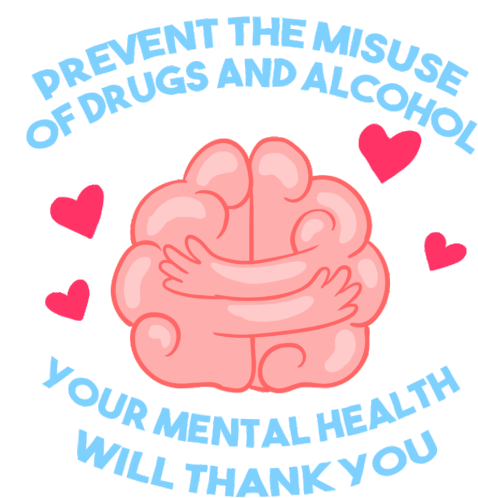Did You Know?
Although drug use has entered the mainstream and is not nearly as taboo as it once was, most people are uneducated on substance abuse . Why is that? And are there reliable resources to find information?
Basics
Substance abuse is the misuse of legal substances and the use of llegal substances in order to experience phenomena that cannot be found anywhere else.
Common legal substances include:- Alcohol
- Tobacco
- Opiates and other Schedule II drugs
- Heroin
- Marijuana
- Crack and other Schedule I Drugs
Reading these lists, you might be wondering: What is a schedule? Well, a schedule is a ranking of drugs by the US government based on its potential for abuse: one (I) being the highest potential and five (V) being the lowest. Schedule I also has the additional trait of not having any medical use and therefore is illegal.*
*Marijuana is legal in some states and is sometimes used medically. Please check your local state laws for specific information.
The Media
How has the media affected people's views on substance use? Surveys say that the media has drasticially affected the way teenagers view substances.
Media often uses tactics to convey an idea: Advertisements tactics can influence people through logos, pathos, and ethos, for example. Minors are especially vulnerable to media "due to preoccupation with personal image and identity that makes them more likely to identify with and model what they view." Combined with increased time online, minors can see plenty of information about substance use (Jackson et al.). However, does the media properly convey the consequences of substance abuse?
The answer is no. The Internet as a whole cannot be regulated: it is simply too vast. For topics concerning substance use, this comes at a disadvantage: The average post is not required by law to detail the effects of substance abuse. As such, people are free to post photos and videos of tobacco, alcohol, and drug use in any light they would like largely without consequence.
Supposedly more regulated things like TV shows or sports may also have problems. Companies of these addictive substances can sponsor these programs, and although they are required by laws to provide the effects, the main focus is making money through capturing their next audience. This often means hiding these effects at the end of the ad, as people would not be inclined to buy if they know the negative consequences.
Even social media algorithms don't have their user's best interests in mind. The goal of most social media algorithms is to present the user with the most engaging posts to keep them on the platform as long as possible. This does not necessarily mean that these posts would be in a user's best interest. If an algorithm deems it, it will present you more posts positively depicting substance abuse, leading you to believe it's a more common phenomena than it really is.
All of these factors can result in a presentation of "glamour, independence, rebelliousness, romance, socializing, and celebrating" for substance use (Jackson et al.). These feelings often appeal to teenagers, as they often struggle with their own identity and place within the world as they venture to adulthood. It's completely normal to feel this way, of course; relationships are indeed important for humans, and how else to get there other than being likable? However, substances can't achieve that. Substance abuse will only harm your appearance, both literally and metaphorically: it can damage your body, make you reliant on it, and ruin your mood and friendships. Always remember: Take what you see with a grain of salt and think carefully before making a decision that could potentially change your life.
Effects
So what are the effects of substance abuse? Of course, specific effects depend on the substance, but all substance users suffer from addiction, dependence, and withdrawal.
Addiction is a condition where you compulsively engage in an activity despite other factors, such as relationships and negative consequences (my.ClevelandClinic.org).
Dependence can come in many forms, psychological dependence, physiological dependence, and emotional dependence.
- Psychological dependence is when you think you need a substance, whether that is true or not.
- Physiological dependence is when your body chemically need the substance. Basically, your body will feel worse if you don't take it.
- Emotional dependence is when your mood changes depending on whether you have engaged with the substance.
When you decide to stop taking a substance, withdrawal may occur, meaning that your body may experience symptoms such as chills and vomiting, and your mind may begin to crave the substance.
These three symptoms, if not properly dealt with, can cause physical, mental/emotional, and social problems. You may gain weight, become less motivated, or lose important relationships. Be sure to consider these things before deciding to use a substance.
Tobacco/Nicotine
All tobacco products contain nicotine, which is the addictive substance in them. Nicotine has a variety of negative effects: It can cause psychological and physiological dependence, raise blood pressure, increase heart rate, and slow down brain waves . Using nicotine products mean you may have a harder time breathing, making day to day life more difficult to experience and the development of your brain may fall behind the expected growth for your age, preventing you from being your best self. In extreme cases, you may need a need a ventilator or supplemental oxygen to continue breathing, greatly reducing the physical activities you can do.
Tobacco products come with a lot of added chemicals, including but not limited to heavy metals, carbon monoxide, and tar.
- Heavy metals are toxic and can be fatal. Lead, a heavy metal found in cigarettes, was linked to the death of children during the time it was featured in household paint.
- Carbon monoxide is considered one of the six air pollutants of the Clean Air, as it contributes to smog formation and can be fatal when it bonds with your blood vessels. It is also produced through vehicles and industrial processes.
- Tar is a sticky, dark fluid produced by burning tobacco. It can harm the lungs by paralyzing and destroying vital parts of your lungs for air delivery and filtration, imparing your ability to breathe and potentially damaging your lungs to the point of removal. It can also make you more suspectible to respiratory diseases, such as bronchitis and pneumonia.
Even in smokeless tobacco products, tobacco can give you respiratory and oral cancer. If you get cancer, you will likely have to deal with it for the rest of your life.
Alcohol
Although the "confidence" from decreased inhibitions from alcohol may be useful for social situations, alcohol still has a variety of negative effects. For one, decreased inhibitions causes you to make risky decisions that you may regret later, such as trying other dangerous substances. Other thought processes are altered as well, such as reflexes, reaction time, and coordination. This may be troublesome if you need to drive home or get into an unfavorable situation. Small amounts of alcohol can increase blood pressure and heart rate, but high levels of alcohol can make heart rhythm become irregular, both making it difficult to breathe. Drinking too much alchohol can result in a coma, or even death.
Some permanent effects of alcohol abuse include an increased risk of liver disease, stroke, and cancer, all of which can be fatal. Alcohol can also lead to changes in the brain, such as frontal lobe damage, damage to neural pathways, and overall reduction of brain mass. Finally, alcohol can lead to vitamin B-1 deficiency, which can cause impaired memory, confusion, and lack of coordination.
Drugs
There are three types of drugs: depressants, stimulants, and hallucinogens.
- Depressants slow messgaes to and from the brain, affecting coordiation. Large amounts of depressants can cause unconsioussness and death. This category includes marijuana and opiates.
- Stimulants speed up messages to and from the brain, making the user feel more confident. They increase heart rate and blood pressure and cause irritation. They can also cause seizures. This category includes amphetamines, cocaine, and ecstasy.
- Hallucinogens distort the reality and users may see things that are not there. They cause a feeling of euphoria, but also a feeling of panic and paranoia. They can also cause severe nausea. This category includes LSD, ketamine, magic mushrooms, and sometimes marijuana.
All drugs can cause an overdose, or death due to too much of a drug. Combining drugs with another substance, such as food, drink, other drugs, or even a health condition can also cause effects, some of which can be dangerous. Finally, sharing needles for injection drugs can increase the risk of contracting diseases such as Hepatitis B or HIV.
Conclusion
All in all, substance use isn't all it's chalked up to be. It can't grant you popularity, independence, or glamour. It has far too many negative effects, both temporary and permanent, to keep up for the rest of your life.
There are many alternatives to using substances. Getting into new hobbies and clubs can make you gain new friends through shared interests, as well as making you a more interesting person. Hanging out with your current friends can also fill in any free time you have! No need to be popular if you already have people to spend time with! Exercising also can release chemicals that make you feel good with the additional benefit of decreasing the risk of diseases instead of increasing it.
If you suffer from substance abuse, that's okay. There are infinite resources to help you, including medical professionals, community resources, and the Internet (despite its many flaws). It will not be a straight road, but if you continuously pursue being substance-free, you will get there one day.
If you need resources or more details on substance use, visit drugfree.org .

